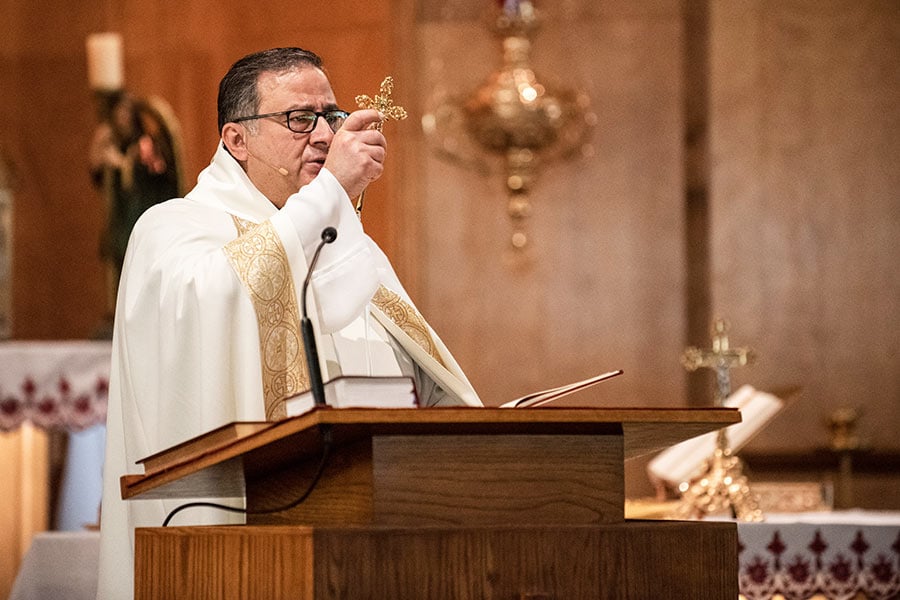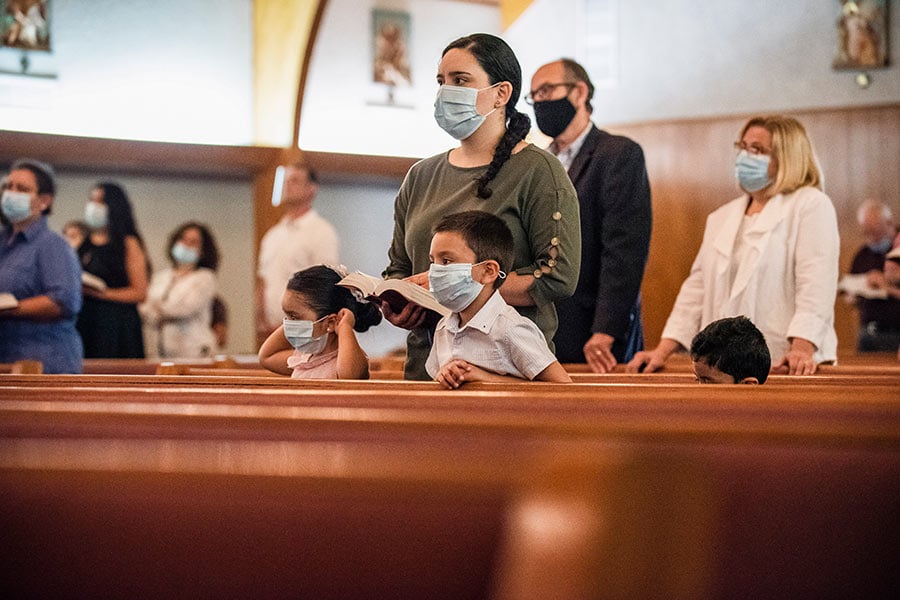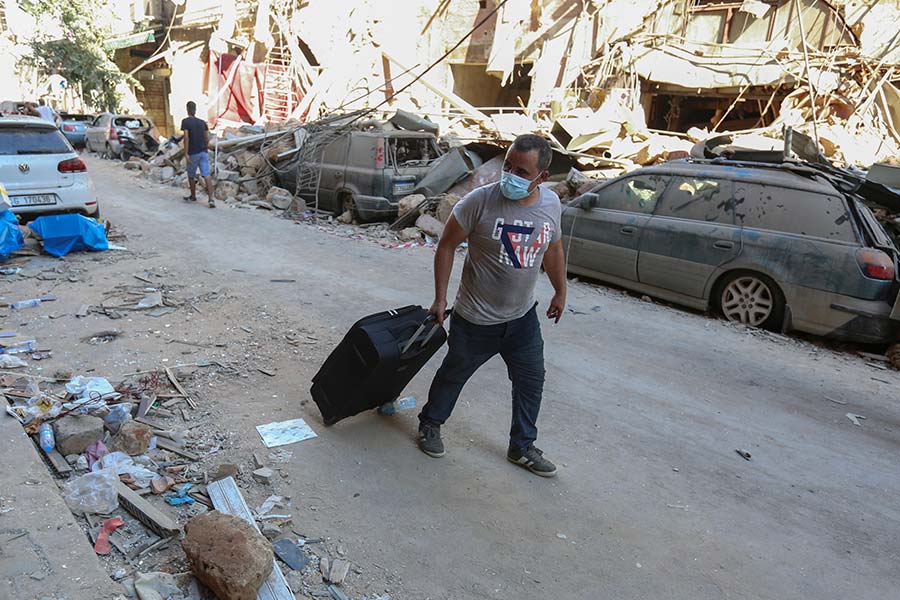Beirut blast hits close to home for Lewisville pastor of Our Lady of Lebanon Church

Fr. Assaad ElBasha gives a blessing during Sunday Mass at Our Lady of Lebanon Maronite Catholic Church in Lewisville, Aug. 09, 2020. (NTC/Ben Torres)
LEWISVILLE — The explosion of ammonium nitrate that leveled Beirut, Lebanon, killing at least 154 people and injuring thousands more on August 4, hit close to home for Maronite Father Assaad ElBasha, pastor of Our Lady of Lebanon Church in Lewisville.
Members of his immediate family were attending a niece’s wedding in a north Lebanon mountain village when the blast, which registered as a 3.3 magnitude earthquake, started toppling buildings. Originally planned as a large celebration with 500 guests, the ceremony had been downsized and moved to a remote location because of the coronavirus pandemic. His relatives escaped injury, but their homes, like most residences in Beirut, were heavily damaged or destroyed.
“My brother, sister-in-law, and nephew work in the American hospital in Beirut, and they use the road where the explosion happened,” explained the pastor. “This wedding saved my family.”
Grateful for the blessing, Fr. ElBasha and his parish are joining an international effort to raise funds for Catholic and Christian families “who lost everything in the beautiful capital city of Beirut.” Maronite Catholics are the largest Christian denomination in Lebanon.
Bishop Michael Olson called on North Texas Catholics to join in that effort by declaring a Special Emergency Collection for Disaster Relief in Beirut on August 22-23. Faithful can also give online at fwdioc.org/beirut-blast-relief.
All donations collected will be directed to the Eparchy of Our Lady of Los Angeles through Our Lady of Lebanon Maronite Catholic Church in Lewisville, in the name of the Diocese of Fort Worth, to help the more than 300,000 people left homeless in the destruction. Many of the victims are family members of parishioners of Our Lady of Lebanon.
The faith community of Our Lady of Lebanon will offer special prayers for victims of the explosion at its 11 a.m. Sunday Mass on August 9.
“Many houses aren’t safe and Beirut’s five major Catholic hospitals in the city are not able to function,” Fr. ElBasha continued. “They are telling families to come and get the patients because the hospitals can’t help them.”
An estimated 5,000 Beirut residents were injured and at least 154 killed when approximately 28 tons of ammonium nitrate, confiscated from a cargo ship six years ago, suddenly blew up in a waterfront warehouse. It’s the same chemical compound used in 1995’s Oklahoma City bombing and the West, Texas fertilizer explosion that killed 15 people in 2013.
“It looks like a nuclear bomb was dropped,” said the Lebanese-born priest. “It turned Beirut into an apocalyptic city.”

Parishioners stand as Fr. Assaad ElBasha says a special prayer for the people of Lebanon at Sunday Mass at Our Lady of Lebanon Maronite Catholic Church in Lewisville, Aug. 09, 2020. (NTC/Ben Torres)
As soon as news of the explosion reached the U.S., Fr. ElBasha began fielding phone calls from worried parishioners with relatives in Beirut.
“Many of the stories are the same,” he continued. “Family members are sitting in the house, and, all of a sudden, the doors and windows are coming down. Some suffered head injuries.”
One 44-year-old patient in a Catholic hospital died when a window fell on him.
“The man has four children,” Fr. ElBasha commented, soberly adding, “He’s related to me.”
Compounding the human and material toll of the tragedy is Lebanon’s ongoing economic and financial bankruptcy.
“It renders the government incapable of facing this human and urban catastrophe,” explained Cardinal Bechara Boutros of Lebanon in a letter appealing to the nations of the world for help. “The Lebanese people are in a state of poverty and indigence.”
A relief network, organized by the Church, is assisting wounded, displaced, and grieving families, but it cannot assume the responsibility alone. The cardinal is asking for the establishment of a fund, under United Nations control, to manage aid.
“What happened is beyond politics and conflict,” he asserted. “I call on charities in different countries to help the Lebanese families so they can heal their wounds and restore their homes.”
Several countries sent medical aid and rescue teams to the area following the tragedy. U.S. military planes joined the relief effort by ferrying food, water, and medical supplies.
Responding to the dire circumstances facing the Lebanese people, Archbishop Jose Gomez of Los Angeles and president of the U.S. Conference of Catholic Bishops issued a statement asking Catholics and “people of good will” to help the afflicted by praying for the intercession of Our Lady of Lebanon, and giving generously.
“In addition, I call on the U.S. government to accelerate any and all humanitarian assistance to Lebanon,” he said.
Interlaced with casualty and damage statistics are stories of courage and survival. Minutes after the blast, a photographer captured a nurse holding three newborns rescued from the maternity ward in a Catholic hospital.

A man pulls his belongings along a street as he evacuates his damaged house in Beirut Aug. 5, 2020, following explosions the previous day. (CNS photo/Aziz Taher, Reuters)
“She didn’t care about her own life, she was carrying three babies in her arms,” Fr. ElBasha said, recalling the image. “The picture of that heroic nurse speaks to how her faith led her to save the gift of life among all those lost in this bad explosion.”
As Lebanese Catholics struggle to rebuild, assistance from fellow Catholics is particularly important. The Lebanese population is estimated to be approximately 40% Christian.
In his first official visit to Lebanon in 1997, Pope John Paul II described Lebanon as “more than a country, it’s a message to the world.”
“It teaches the whole world how Catholics and Muslims can live together,” Fr. ElBasha explained. “In this time of crisis, we need to be [good] Samaritans and help each other.”
